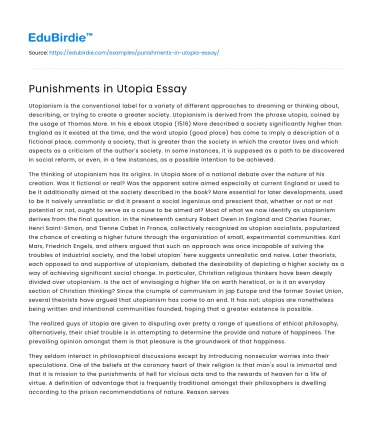Introduction
The concept of punishment in utopian societies poses a fascinating paradox. Utopia, by definition, represents an ideal society where harmony and justice prevail. However, the necessity and nature of punishment in such a setting challenge the very essence of utopia. This essay explores the theoretical framework and practical implications of punishment in utopian societies. Drawing on philosophical texts, including Thomas More's "Utopia," and contemporary interpretations, the essay examines whether punishment can exist in a utopia and, if so, how it might differ from the punitive measures in our current legal systems. This exploration seeks not only to understand the role of punishment in maintaining social order but also to question underlying assumptions about human nature and societal perfection. Furthermore, the essay considers counter-arguments, such as the potential redundancy of punishment in a truly perfect society, thereby offering a nuanced perspective on this complex issue.
Philosophical Perspectives on Punishment in Utopia
In Thomas More's seminal work "Utopia," the depiction of punishment provides a starting point for understanding its role in an ideal society. More's Utopia, while striving for harmony, does not entirely eliminate crime or the need for correctional measures. Instead, it adopts a restorative approach, focusing on rehabilitation rather than retribution. For instance, thieves in Utopia are not sentenced to death but are instead made slaves, as noted by More (1516), "not only to repay what they have stolen but also to learn the value of honest labor." This philosophical stance aligns with the utilitarian view that punishment should serve a purpose beyond mere vengeance, aiming to reform the offender and restore societal balance.
Save your time!
We can take care of your essay
- Proper editing and formatting
- Free revision, title page, and bibliography
- Flexible prices and money-back guarantee
Moreover, the notion of punishment in utopian societies challenges traditional views on human nature. Philosophers such as Rousseau have argued that humans are inherently good and that societal flaws are the root of criminal behavior. In a utopian setting, where social structures are perfected, the argument follows that crime would naturally diminish or transform into acts requiring guidance rather than punishment. Hence, the punitive measures in utopias are more educational and reformative, reflecting an optimistic view of human potential for change. Nonetheless, this perspective raises questions about the feasibility of such systems, particularly when considering ingrained behavioral and psychological aspects of crime.
Transitioning from philosophical underpinnings to practical considerations, it becomes evident that the implementation of punishment in utopian societies must balance idealism with realism. While the philosophical ideals present a compelling vision of humane correctional systems, the practical execution requires careful consideration of societal dynamics and human psychology. This brings us to the exploration of contemporary models that strive to embody these utopian principles in real-world contexts.
Contemporary Models and Real-World Applications
Examining contemporary models of punishment that resonate with utopian ideals reveals a growing trend towards restorative justice systems. These models emphasize healing and reconciliation over punitive measures, drawing inspiration from utopian concepts. For instance, the restorative justice practices implemented in New Zealand's juvenile justice system focus on community involvement and victim-offender mediation, reflecting a shift from retributive justice to a more inclusive, rehabilitative approach. According to Maxwell and Morris (2006), these practices have resulted in lower recidivism rates and increased satisfaction among victims and offenders alike, demonstrating the potential efficacy of utopian-inspired systems.
However, the transition from theoretical utopia to practical application is fraught with challenges. Critics argue that restorative justice may not adequately address severe crimes or deter potential offenders. Furthermore, the success of such systems often hinges on societal readiness to embrace change and the availability of resources to support comprehensive rehabilitation programs. As pointed out by Daly (2002), "the utopian ideal of a society without punishment remains challenging under current socio-economic conditions," highlighting the need for a pragmatic approach that considers existing limitations.
Despite these challenges, the ongoing evolution of justice systems worldwide indicates an openness to integrating utopian principles. This evolution suggests a growing recognition of the limitations of traditional punitive measures and a willingness to experiment with alternative models. As societies continue to grapple with issues of crime and punishment, the utopian vision offers a valuable framework for reimagining justice in a way that prioritizes human dignity and societal harmony.
Transitioning from contemporary applications to a broader reflection on the implications of punishment in utopia, it becomes apparent that the discussion extends beyond legal systems to encompass broader societal values and aspirations. The exploration of utopian ideals prompts a reevaluation of how societies define justice and the means by which they seek to achieve it.
Conclusion
In conclusion, the examination of punishment in utopian societies reveals a complex interplay between idealism and pragmatism. While utopian visions challenge traditional punitive paradigms, advocating for rehabilitation and restorative justice, the practical application of these ideals requires careful navigation of societal and psychological realities. The enduring appeal of utopian concepts lies in their ability to inspire innovative approaches in contemporary justice systems, offering a glimpse of a more humane and equitable future. However, the realization of such ideals necessitates a collective commitment to rethinking entrenched assumptions about crime, punishment, and human nature. As societies continue to evolve, the lessons gleaned from utopian thought provide a valuable guide for envisioning justice systems that reflect the highest aspirations of humanity. Ultimately, the pursuit of utopia, while elusive, serves as a catalyst for progress, challenging us to continually strive for a more just and harmonious world.






 Stuck on your essay?
Stuck on your essay?

